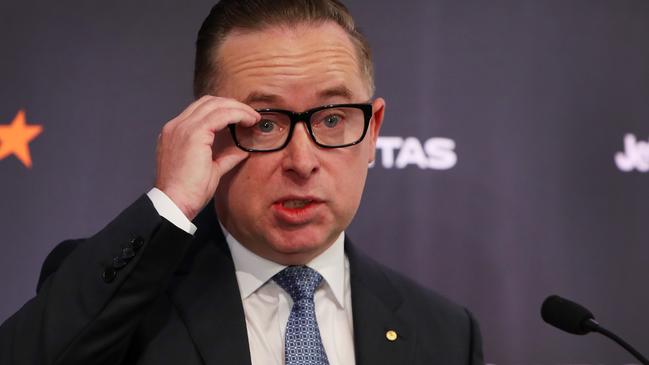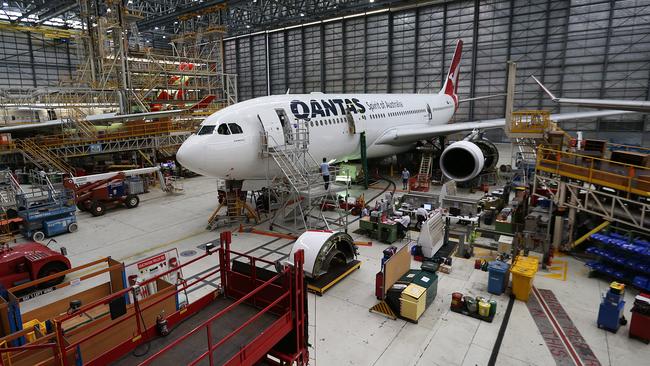Qantas boss Alan Joyce stands by pandemic sackings, unveils 8500 jobs by 2033, new academy
Chief executive Alan Joyce has implied he has no regrets about the 9000-plus Covid sackings, as he unveils plans to recruit thousands by 2033 and train new engineers.

Qantas boss Alan Joyce has implied he has no regrets about laying off more than 9000 people during the Covid pandemic, as he launched a major recruitment drive to rebuild the airline’s workforce.
Speaking in Melbourne on Friday, Mr Joyce announced plans to increase the Qantas workforce to 32,000 by 2033 with the addition of 8500 cabin crew, pilots, engineers and airport staff.
During the pandemic Qantas employees were slashed from 29,000 to under 20,000 but have since regrown to 23,500.
Overall, 30,000 people are expected to be hired over the next decade, accounting for regular attrition as well as growth.
They will not include the 1600 ground handling jobs outsourced at the height of the Covid pandemic, the legality of which is now the subject of a High Court battle.
Asked if he regretted the cuts made during Covid, Mr Joyce said like many others, the airline did what was necessary to survive.
“We made people redundant to survive and a lot of people left the industry anyway because there was no work for nearly three years,” Mr Joyce told Today.
“So what we’re now doing is recruiting to fill that gap and to take up the growth we’re going to have because we’re going to have a lot of new aircraft flying new routes.”

Mr Joyce also announced the intention to make a multimillion dollar investment in a Qantas Engineering Academy with the capacity to train up to 300 engineers a year.
He said the academy would open in 2025, and operate in the same way as the airline’s pilot training school at Toowoomba with a third party registered training organisation.
A location for the academy was yet to be determined but it was likely to be either Brisbane, Melbourne or Perth.
“Aviation is so important to a country like Australia and you need a big skills pipeline to power it. That’s not just about the major airlines but also small regional operators, defence and general aviation,” Mr Joyce said.
“It’s a whole ecosystem that pilots and engineers, in particular, make their way through, and the long-term skills base required means it relies on constant renewal.”
Key to the jobs growth, was Qantas’s domestic fleet renewal that would see existing Boeing 737-800s and Boeing 717s replaced with A321neos and A220s.
Qantas, Jetstar and QantasLink are expecting to take delivery of up to 299 narrow-body and 12 wide-body aircraft over the next decade, to reshape the group’s network.
“We order aircraft up to 10 years in advance, so we need to think similarly long-term about the people and skills we need to operate them,” said Mr Joyce.
The announcement won rare plaudits from the Australian Workers Union which said the new engineering academy was “a potential turning point for technical jobs”.
AWU national secretary Daniel Walton said the union had been crying out for investment in the skills of tomorrow and other major employers should take note.
“I call on other major Australian employers to take this as a sign of turning tide and to start making their own plans to invest strongly in Australian apprenticeships and Australian skills,” Mr Walton said.
The Transport Workers Union was not so enamoured, saying no jobs drive would ever replace the experience lost at Qantas through “overzealous redundancies”.
“Unless there is a meaningful shift in ideology and strategy under a new management team, Qantas will never return to the airline it once was,” said TWU national secretary Michael Kaine.
“The Spirit of Australia was built by workers who held sought-after careers at Qantas, but those workers are gone and jobs are now lower-paid and insecure.”
Mr Joyce was joined at the announcement by Federal Minister for Skills and Training Brendan O’Connor who said Australia had the second highest labour supply shortage.
“This is a major economic challenge. But it is also an opportunity of a lifetime for people to get the right skills for jobs that are in demand,” Mr O’Connor said.
The Minister also praised Qantas for its policy of acknowledging the traditional owners on every flight, saying it was “corporate leadership at its best”.
“I appreciate that,” he said.






To join the conversation, please log in. Don't have an account? Register
Join the conversation, you are commenting as Logout